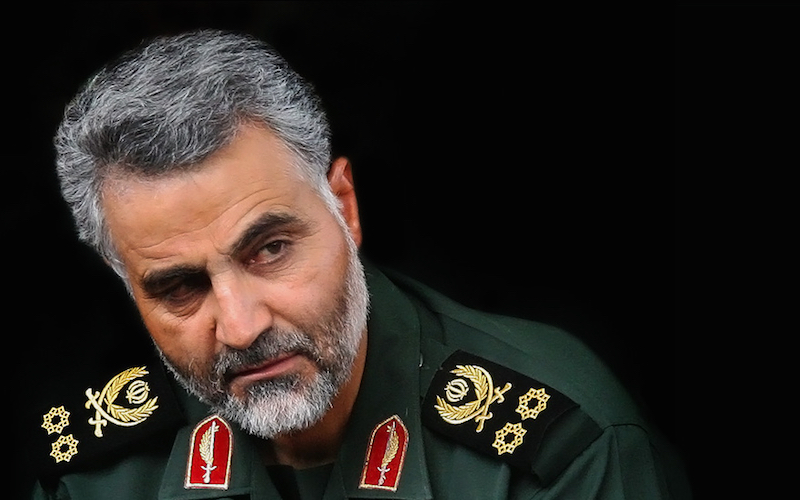
Will Qasem Soleimani Become the Next President of Iran?
Since the beginning of the civil war in Syria, Iranian media has portrayed Qasem Soleimani as a “Muslim Che guevara.” However, the news coverage related to Qasem Soleimani has changed during the last few months. While his presence in Syria and Iraq and speculations about his meetings with Vladimir Putin were previously reported in the news, and it was stated that his consultations with Putin urged Russia to perform a military airstrike in Syria, now the number of his internal speeches in the House of Representatives and among military commanders and police chiefs has increased. Recently, he has talked about the necessity of “religious” and “revolutionary” management and the need to “protect Islam.”
In this regard, the daily newspaper Vatane Emrooz, one of the main opponents of the Iran nuclear deal, which, aligned with the Keyhan newspaper, now routinely features Soleimani’s photo and routinely publishes Soleimani’s statements regarding domestic policy which may indicate the high probability of his presence in the next presidential election.
Soleimani has a close relationship with hardliners and reformists, however, the slogans he gives and his keywords, namely “martyr,” “revolutionary values,” and “protection of Islam,” are those emphasized by the hardliners opposed to Rouhani and Iranian reformists.
The recent parliamentary elections in Iran have been associated with a huge failure of hardliners and conservatives. Ayatollah Mohammad Yazdi and Ayatollah Mesbah-Yazdi, two of the main conservative clergymen, were defeated in the Assembly of Experts election. There have been some rumors about the presence of Ahmadinejad for another time, but those around him have been accused of financial corruption and government mismanagement.
Soleimani is a good choice for hardliners in the next presidential election. His name was first heard in the area of domestic policy before the 2013 election, when he was asked to be nominated for the election, but he refused. Soleimani is one of the few politicians within the Iranian political system who is popular among a number of voters. The results of a 2013 survey, conducted by the Mehr News Agency, revealed that he is even more popular than Mohammad Javad Zarif.
But who is Qasem Soleimani? He was born in Kerman province in 1957. As a teenager he joined The Revolutionary Guards after the 1978 revolution. Prior to that, he worked in the Kerman water organization for a while. Soleimani was the commander of 41st Sarollah division and maintained this position several years after the war. He was appointed as the commander of the Qods Force of the Iranian Revolutionary Guards.
The name of Qasem Soleimani has been raised a few times in the arena of domestic policy. For example, he, along with a number of commanders of the Iranian Revolutionary Guards, wrote a letter to Mohammad Khatami in 1999 regarding the events that occurred after the students’ protests on July 9, asking him not to react “passively.” They wrote, “Dear Mr. Khatami, how long do we have to shed tears, sorrow over the events, practice democracy by chaos and insults, and have revolutionary patience at the expense of sabotaging the system? Dear president, if you don’t make a revolutionary decision and act according to your Islamic and national missions, tomorrow will be so late and irrecoverable that cannot be even imagined.”
Another signatory of this letter was Mohammad Bagher Ghalibaf, one of the former commanders of the Revolutionary Guard and the current mayor of Tehran. He is one the closest friends of Soleimani. It has been stated that in 2005, Ghalibaf suggested that Soleimani become the police chief, which didn’t happen.
Qasem Soleimani doesn’t have a positive attitude towards the west. For example, in September 2015, he stated that the presence of Europeans in Iran is coordinated by America. In the domestic arena, Soleimani, like the hardliners, calls for a more religious society. He stated in 2015 that promoting the elimination of religion in the society is treason.
The present conditions are not favorable to Rouhani. He doesn’t have much time to improve people’s living conditions in the post-sanction period and the conservatives are not satisfied with Rouhani’s cultural and social policies and blame him for the nuclear agreement which has had no tangible effects on Iran’s economy. Meanwhile, the hardliners can count on Soleimani who has been somehow introduced as a “national hero,” wasn’t involved in financial corruptions, and has a good relationship with the supreme leader. At the same time, by decreasing the number of clergymen in the next house of representative, it might be expected that someone from the military will emerge to run for president.

